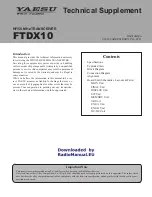
18
www.javad.com
provide optimal positioning.
• Once the red POS LED is green, the receiver has
a position and surveying can begin; wait for green
light before beginning data collection. This en-
sures that the receiver has the correct date and
time, and is locked on to enough satellites to en-
sure good quality data.
• The process of locking on to satellites normally
takes less than one minute. In a new area, under
heavy tree canopy, or after resetting the receiver, it
may take several minutes.
• To begin collecting data, press and hold the Re-
cord button (for more than one second and less
than five seconds).
• Release the Record button when the REC (record-
ing) LED turns green. This indicates that a file has
opened and data collection has started. The REC
LED blinks each time data is saved to the internal
memory.
When finished, press and hold the Record button
until the REC LED light goes out.
To turn off the receiver, press and hold the power
key until all lights go out, then release.
Static Surveying for Base Stations
Static surveying is the classic survey method, well
suited for all kinds of baselines (short, medium, long).
At least two receiver antennas, plumbed over survey
marks, simultaneously collect raw data at each end of
a baseline during a certain period of time. These two
receivers track four or more common satellites, have
a common data logging rate (5–30 seconds), and the
same elevation mask angles. The length of the obser-
vation sessions can vary from a few minutes to sev-
eral hours. The optimal observation session length
depends on the surveyor’s experience as well as the
following factors:
• The length of the baseline measured
• The number of satellites in view
• The satellite geometry (DOP)
• The antenna’s location
• The ionospheric activity level
• The types of receivers used
• The accuracy requirements
• The necessity of resolving carrier phase ambigu-
ities
Generally, single-frequency receivers are used for
baselines whose lengths do not exceed 15 kilometers
(9.32 miles). For baselines of 15 kilometers or greater,
use dual-frequency receivers.
Dual-frequency receivers have two major benefits.
First, dual frequency receivers can estimate and re-
move almost all ionospheric effect from the code and
carrier phase measurements, providing much greater
accuracy than single-frequency receivers over long
baselines or during ionospheric storms. Secondly,
dual-frequency receivers need far less observation
time to reach the desired accuracy requirement.
After the survey completes, data the receivers col-
lect can be downloaded onto a computer and pro-
cessed using post-processing software (for example,
JAVAD GNSS Justin).
Kinematic (Stop & Go) Surveying for Rover
Stations
In a kinematic, stop and go survey, the stationary
receiver (Base station) is set up at a known point such
as a survey monument, or an unknown point. The re-
ceiver continually tracks satellites and logs raw data
into its memory. The Rover receiver is set up at an
unknown point and collects data in static mode for
2 to 10 minutes. When finished, assign the Rover to
kinematic status and move to the next survey point.
At this point, and each subsequent point, the receiv-
er is changed to static mode to collect data. So, while
moving, the Rover is in kinematic mode, and while
collecting data, the Rover is in static mode.
• Set up the Rover at an unknown point and press
power. Allow the Rover to collect static data for
two to ten minutes. The REC LED will be yellow.
• Check the SAT light for satellites tracked.
• When finished, press the FN button for less than
1 second to assign the Rover to kinematic.
• Move the Rover to the next location (survey
point), and press the FN button for less than a sec-
ond to collect the data in static mode for two to ten
minutes.
• Repeat steps five and six until all points have
been surveyed. The occupation time for the points
depends on the same factors as for the static sur-
vey method.
• When finished, press the FN button for one to five
seconds to stop logging data. Turn off the Rover if
needed. This method of GNSS survey allows the
operator to reduce the point occupation time, thus
permitting field crews to survey many more points
compared to the other methods available.







































